
Critical Care Nurse
Scope & Guideline
Transforming Theory into Practice for Patient-Centered Care
Introduction
Aims and Scopes
- Evidence-Based Practice Implementation:
The journal emphasizes the importance of integrating evidence-based protocols and guidelines into clinical practice, focusing on improving patient outcomes through structured and systematic approaches. - Quality Improvement Initiatives:
A core area of focus is quality improvement projects aimed at enhancing care delivery in intensive care environments, particularly regarding infection control, patient safety, and nursing workflow. - Interprofessional Collaboration:
The journal highlights the significance of teamwork among healthcare professionals, advocating for collaborative practices that enhance patient care and safety in critical settings. - Patient and Family-Centered Care:
The journal recognizes the role of families in the care process, publishing research that explores communication strategies and support systems for families of critically ill patients. - Workforce Well-Being and Resilience:
Addressing nurse burnout, resilience, and professional development is a priority, with articles focused on strategies to support the workforce in high-stress environments.
Trending and Emerging
- Mental Health and Well-Being of Nurses:
There is a growing emphasis on the mental health and well-being of nursing staff, with research exploring strategies to combat burnout and promote resilience in the face of high-stress environments. - Technology Integration in Patient Care:
The integration of technology in critical care settings is increasingly prevalent, with articles focusing on telehealth, remote monitoring, and digital tools that enhance patient management. - Patient Mobility and Rehabilitation:
Research on early mobility protocols and rehabilitation practices for critically ill patients is gaining attention, recognizing the importance of mobility in recovery and outcomes. - Diversity and Cultural Competence in Nursing:
Emerging themes around diversity, equity, and cultural competence in nursing practice are becoming prominent, reflecting a broader societal push for inclusivity in healthcare. - Advanced Practice and Specialty Certifications:
The trend towards advanced practice roles and specialty certifications is increasing, with the journal highlighting the importance of specialized training and knowledge in critical care nursing.
Declining or Waning
- Traditional Sedation Practices:
While sedation management remains crucial, there has been a noticeable decline in articles focusing on traditional sedation methods as newer, evidence-based approaches gain traction. - Basic Nursing Skills Training:
The journal has shifted away from emphasizing basic nursing skills training, reflecting a move towards advanced practice and critical thinking in nursing education. - Reactive Care Models:
There is a waning interest in reactive care models, with a stronger focus now on proactive and preventive strategies in patient management. - Generalized Case Reports:
The publication of generalized case reports has decreased, as the journal increasingly prioritizes research that demonstrates broader implications for practice rather than isolated cases. - Historical Perspectives in Nursing:
Interest in historical analyses of nursing practices and education has diminished, as contemporary issues and innovations take precedence in the discourse.
Similar Journals
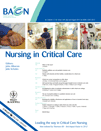
Nursing in Critical Care
Championing the evolution of nursing practices in high-stakes environments.Nursing in Critical Care is a premier journal dedicated to the advancement of knowledge and practice in the field of critical care nursing. Published by WILEY, this esteemed journal has established itself as a leader in the domain, holding a prestigious Q1 ranking in Critical Care Nursing as of 2023, and ranking as the 2nd out of 27 in its category according to Scopus, with an impressive 94th percentile. Since its inception in 1996, it has been an essential platform for disseminating cutting-edge research, evidence-based practices, and critical insights that directly impact patient outcomes in high-stakes environments. While not an Open Access journal, it offers accessible options for institutions and individuals dedicated to the continuous evolution of nursing practices in critical care settings. The journal promises to remain at the forefront of the discipline, providing invaluable resources for researchers, practitioners, and students alike who aspire to enhance their expertise and improve the standards of care within intensive health scenarios.
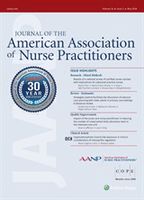
Journal of the American Association of Nurse Practitioners
Fostering Growth in Nurse Practitioner Education and ResearchJournal of the American Association of Nurse Practitioners is a leading publication dedicated to the advancement of nurse practitioner research, education, and practice. Published by Lippincott Williams & Wilkins, this journal focuses on disseminating innovative findings, clinical approaches, and evidence-based practices that enhance patient care and the profession's stature. With an ISSN of 2327-6886 and an E-ISSN of 2327-6924, the journal has established a significant presence within the academic community, boasting a 2023 Q2 ranking in Nursing and a Q3 in the broader category of Medicine (miscellaneous). Its indexed position—ranked #70 out of 139 in General Nursing by Scopus—reflects its commitment to quality and relevance in the field. Open access options further ensure that research findings are readily available to practitioners, educators, and students, facilitating a greater impact on patient outcomes and nursing practices. With content spanning from 2013 to 2024, the journal continues to serve as a pivotal resource for those endeavoring to enhance the expertise of nurse practitioners worldwide.
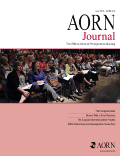
AORN JOURNAL
Advancing Knowledge, Elevating Care.AORN JOURNAL, a reputable publication in the field of Medical and Surgical Nursing, has been at the forefront of nursing education and practice since its inception in 1963. Published by WILEY, this peer-reviewed journal serves as an essential resource for nurses, educators, and healthcare professionals seeking to enhance their knowledge and skills in perioperative care. With an impressive ranking of 15th out of 26 in its category according to Scopus, and a Q2 rating in the 2023 category quartiles, the AORN JOURNAL consistently provides high-quality research, innovative practices, and evidence-based guidance. While currently not an open-access journal, it offers valuable insights and practical solutions to complex challenges in surgical settings, making it a crucial tool for advancing the nursing profession. The journal's commitment to fostering excellence in patient care continues to empower professionals and students alike, ensuring they stay at the leading edge of medical knowledge and practice.
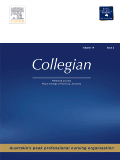
Collegian
Elevating Nursing Scholarship with Rigorous Insights.Collegian is a distinguished academic journal published by Elsevier, focusing on the dynamic field of nursing. Launched in 1994 and continuing through to 2024, it aims to contribute to the advancement of nursing knowledge and practice. With an ISSN of 1322-7696 and an E-ISSN of 1876-7575, this journal has achieved an impressive standing, securing a Q2 category ranking within Nursing (miscellaneous) and positioning itself at #49/139 in the general nursing category on Scopus, with a commendable 65th percentile. The journal provides a platform for both established researchers and emerging scholars to share innovative research, case studies, and reviews that shape nursing education and practice. Although not open access, it remains widely recognized for its rigorous peer-review process and substantial contributions to nursing literature. As the profession evolves, Collegian stands out as a pivotal resource for professionals, educators, and students who seek to enhance their understanding and application of nursing science.
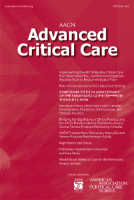
AACN Advanced Critical Care
Elevating clinical practice with cutting-edge insights.AACN Advanced Critical Care, published by the American Association of Critical-Care Nurses, serves as an essential resource in the field of critical care nursing and emergency medicine. With an ISSN of 1559-7768 and an E-ISSN of 1559-7776, this peer-reviewed journal is committed to advancing the knowledge and practice of critical care through rigorous research and innovative clinical insights. The journal holds a reputable position within its field, achieving a Q2 ranking in Critical Care Nursing and Emergency Medicine, alongside a Q3 ranking in miscellaneous Medicine categories for 2023. With a convergence of scholarly contributions from 2006 to 2024, it strives to explore the latest advancements and challenges in critical care environments, ensuring that its readership of researchers, healthcare professionals, and students are well-informed of emerging trends and best practices. The journal does not offer Open Access, however, its impact and relevance are evident from its Scopus rankings, which place it at a commendable #14 in Critical Care Nursing and #47 in Emergency Medicine. As a crucial platform for knowledge dissemination, AACN Advanced Critical Care plays a vital role in enhancing clinical effectiveness and improving patient outcomes in acutely ill populations.
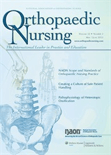
Orthopaedic Nursing
Advancing Orthopaedic Care Through KnowledgeOrthopaedic Nursing, published by Lippincott Williams & Wilkins, is a vital journal dedicated to advancing the knowledge and practice of orthopaedic nursing. With its ISSN 0744-6020 and E-ISSN 1542-538X, this journal has been a cornerstone in the field since its inception in 1981 and continues to disseminate groundbreaking research and critical insights through to 2024. The journal is categorized in the third and fourth quartiles across various nursing and medical disciplines, reflecting its niche but impactful presence within the realms of Advanced and Specialized Nursing, Medicine (miscellaneous), and Orthopedics and Sports Medicine. Although it operates under a traditional access model, the importance of its articles—addressing both theoretical and practical aspects of orthopaedic care—cannot be overstated. Researchers, practitioners, and students alike will find Orthopaedic Nursing an indispensable resource for enhancing their understanding of contemporary practices and the evolving landscape of patient care in orthopaedics.
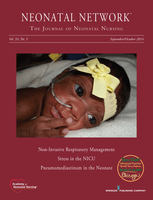
Neonatal Network
Empowering practitioners with vital neonatal research.Neonatal Network, published by Springer Publishing Co, is a respected journal in the field of Critical Care and Intensive Care Medicine, focusing on the complexities of neonatal health and development. With an ISSN of 0730-0832 and an E-ISSN of 1539-2880, this journal has been a vital resource for practitioners, researchers, and students since its inception in 1985. Covering a pivotal scope that encompasses Critical Care Nursing, Pediatrics, and Perinatology, it aims to enhance the understanding and treatment of newborns in critical conditions. Although categorized in the Q3 and Q4 quartiles by Scopus for 2023, its contributions remain significant, fostering a platform where innovative research and clinical wisdom converge for the benefit of neonatal care. As a non-open access journal, it provides insightful articles that are pivotal for enhancing neonatal practices and outcomes, ensuring its relevance as a distinguished academic outlet through 2024. The journal's rich history and focus on interdisciplinary collaboration make it an essential resource for those committed to advancing neonatal health.
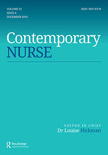
Contemporary Nurse
Championing evidence-based nursing for impactful healthcare.Contemporary Nurse is a leading journal in the field of nursing, published by Routledge Journals, Taylor & Francis Ltd. With a commitment to advancing healthcare practice through innovative research, this journal serves as an essential resource for nursing professionals, researchers, and students alike. Its Q2 ranking in the field underscores its influence and significance, placing it among the top journals within its category. The journal covers a broad scope of topics within nursing, ensuring that it remains relevant to contemporary healthcare challenges. The journal, which has been in publication since 1992, welcomes a diverse range of articles that contribute to nursing education, practice, and policy. While it does not currently offer open access, articles are accessible through institutional subscriptions. As the nursing field continues to evolve, Contemporary Nurse remains a vital platform for scholars and practitioners to disseminate groundbreaking research and engage with new ideas.
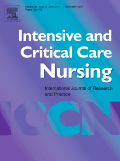
Intensive and Critical Care Nursing
Elevating patient care in critical settings.Intensive and Critical Care Nursing is a premier peer-reviewed journal published by Elsevier Science Ltd, dedicated to advancing the field of critical care nursing through high-quality research, innovative practice, and critical analysis. With an impressive impact factor, this journal is recognized as a leading resource in Critical Care Nursing, holding the esteemed Q1 quartile designation and ranking first among 27 journals in its category, placing it at the 98th percentile. Since its inception in 1992, the journal has been committed to fostering an interdisciplinary dialogue among researchers, clinicians, and educators, ultimately aiming to improve patient outcomes in critical care settings. While currently not offering open access options, the journal is highly accessible through leading academic databases, ensuring that cutting-edge research reaches its intended audience. Explore the latest findings and developments in critical care nursing that shape and influence practice across the globe.
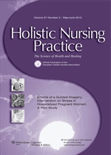
Holistic Nursing Practice
Elevating nursing practices with a comprehensive approach.Holistic Nursing Practice is a prestigious academic journal dedicated to advancing the field of nursing through a holistic perspective. Published by LIPPINCOTT WILLIAMS & WILKINS, this journal features a range of peer-reviewed articles that address both advanced nursing practices and integration of complementary and alternative medicine. With an ISSN of 0887-9311 and an E-ISSN of 1550-5138, it serves as an essential resource for researchers, professionals, and students striving to enhance patient care and wellness from a comprehensive standpoint. The journal has consistently been recognized for its quality, holding a Q2 ranking in Advanced and Specialized Nursing and Complementary and Alternative Medicine in 2023, placing it among the top tier of nursing publications. As it continues to publish impactful research from its inception in 1986 through to 2024 and beyond, Holistic Nursing Practice stands as a pivotal platform for innovations that shape the nursing landscape and optimize health outcomes.